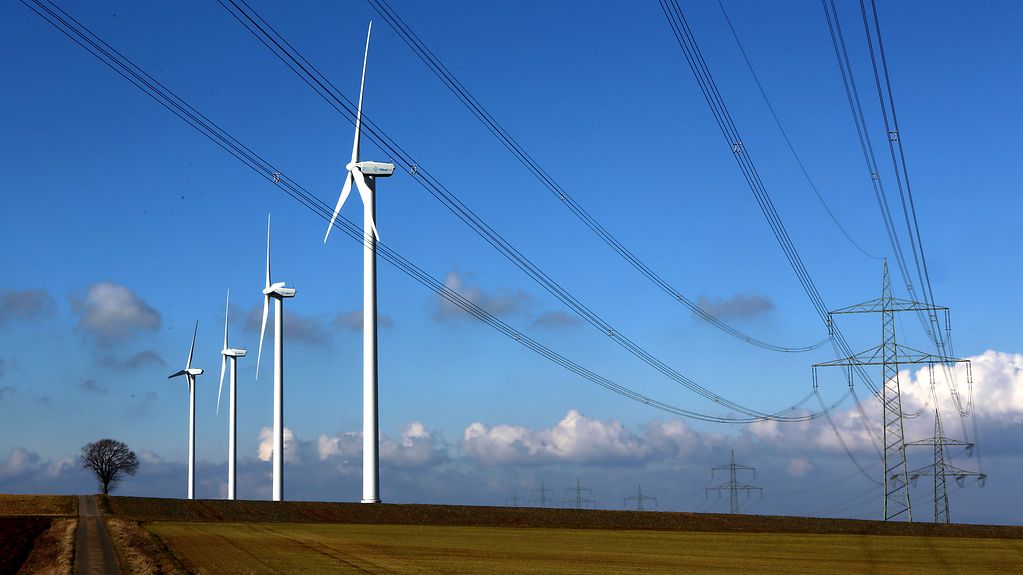Energy Efficiency Act
Public authorities, corporations, and data centres are obliged by the new Energy Efficiency Act to use less energy on the grounds that climate protection and the energy transition will only succeed if energy consumption in Germany is permanently reduced. The Federal Cabinet has now adopted the draft law.
3 min reading time

Electricity pylons and wind turbines in North Rhine-Westphalia: the Federal and Länder Governments are to reduce their energy consumption by 50 terawatt hours by 2030.
Photo: picture alliance/R. Goldmann
Protecting the climate and completing the energy transition will necessitate a significant and long-term reduction in energy consumption, which will simultaneously make a significant contribution to securing supplies for the German energy system. The extremely tense situation in the energy markets following Russia's offensive against Ukraine last year, which was contrary to international law, has highlighted the necessity of using energy sparingly and efficiently.
The new Energy Efficiency Act creates the first cross-sectoral framework for greater energy efficiency whilst also making a significant contribution towards achieving Germany's climate targets and implementing key requirements of the revised EU Energy Efficiency Directive (EED). The intention is to implement the new measures as soon as possible in order for them to be sufficiently effective to meet the 2030 targets. The Federal Cabinet approved the Energy Efficiency Act draft and the amendment to the Energy Services Act on Wednesday.
Ambitious energy targets for Germany
The new legislation establishes efficiency targets for Germany for primary and end user energy consumption for 2030, 2040, and 2045. The targets for 2030 are consistent with those set out for Germany in the revised EU Energy Efficiency Directive (EED). Targets have also been established for 2040 and 2045 to ensure planning and investment security at an early stage; these targets will be reviewed in 2027 and adjusted if necessary.
These energy-saving targets are compatible with the ambitious standards set out in the German Climate Protection Act. For example, a reduction in final energy consumption of more than 550 terawatt hours compared with 2008 is required by 2030. How effective is this legislation and how close is Germany to achieving these targets? Going forward, the Federal Government will regularly report to the Bundestag on this at the beginning of every legislative period and will also decide on potential readjustments to the instrument mix.
Better energy management at the federal, state, and local levels
This act also obliges the Federal Government and the Länder to implement energy-saving measures in compliance with EU targets as of 2024, the aim being for the Federal Government and the Länder to achieve annual energy savings of 45 terawatt hours and five terawatt hours respectively by 2030. In order to become role models in the field of energy efficiency, the Federal Government, the Länder, and local authorities will have to introduce energy or environmental management systems.
Obligatory compliance on the part of businesses and data centres
Companies whose annual energy consumption exceeds 15 gigawatt hours will also be required to implement energy or environmental management systems and to document their energy efficiency measures in detailed plans and publish them. Businesses will also be required to avoid generating waste heat during production processes going forward or, where this is not possible, to make effective use of the waste heat.
Energy efficiency standards will also be introduced for new data centres, which will be obliged to utilise waste heat and to make economical use of cooling system power. Efficiency requirements are also being introduced for existing data centres.
To learn more about energy and climate protection, please visit our topic-related webpage.